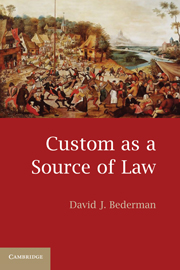9 - Constitutional Law
Published online by Cambridge University Press: 05 June 2012
Summary
Constitutional law is the most public of domestic public-law topics. Indeed, the entire notion of a polity’s fundamental law would seem to be the ultimate exemplar of a legal domain that should, in the construct of writers such as James Coolidge Carter, H. L. A. Hart and T. F. T. Plucknett, be utterly immune from customary influences. Inasmuch as constitutions are a lex scriptum, custom should, under this theory, play no role in their construction, application, or interpretation.
The reality is that customary regimes have not only been a historical feature of English constitutional governance from the Middle Ages, but also have contemporary relevance in separation-of-powers debates within the tradition of U.S. constitutionalism. So, even in this most public of legal arenas, customary regimes can survive and flourish. Any explanation for this ostensible paradox must account not only for the historic origins of custom and the common law (narrated in Chapter 3), but also the continued relevance of the practices of political branches in the resolution of structural or institutional disputes within domestic polities. Constitutional custom is not only a historical construct; it is a phenomenon associated with the common law of government officerial prerogatives, as well as a pragmatic approach to the resolution of separation-of-powers disputes.
- Type
- Chapter
- Information
- Custom as a Source of Law , pp. 101 - 114Publisher: Cambridge University PressPrint publication year: 2010



